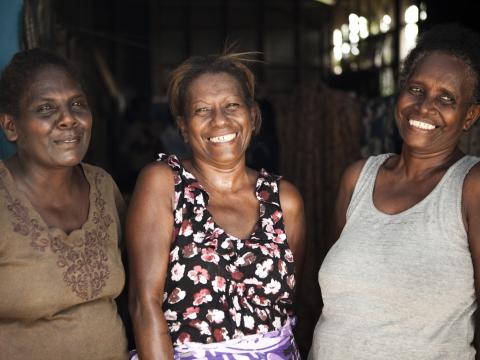Women and Education: Important for development of Solomon Islands

International Women’s Day was celebrated in the Solomon Islands with a parade of over 200 women, men and children through the capital followed by speeches, music, dance and theatre performances by local women’s groups. This year’s theme in Solomon Islands,Ikol lidasip fo mere en man save senisim en strongem kandere (Equal leadership for women and men makes for a strong country) highlighted the important role women play in the development of the Solomon Islands and the need for women and men to work together to address barriers to gender equality.
World Vision joined the Ministry of Women, Youth, Children and Family Affairs, NGOs, donors, churches, community groups, schools and hundreds of men and women to show support for women and men working together to build a stronger Solomon Islands on International Women’s Day.
Jane Tozaka, Western Provincial Member of Parliament and one of the few women in Solomon Islands provincial government, highlighted the important role of women and education in the development of a country. Ms Tozaka addressed a crowd of nearly 400 people gathered outside the National Art Gallery where she said women’s empowerment and gender equality was at the heart of creating a better future for Solomon Islands.
“We can build Solomon Islands as a healthy nation through the involvement of our women in meaningful education for all in our country,” Ms Tozaka said. “Through educating our young women and mothers, we will make a difference and improve our economy and country,” she said.
More women and girls are getting the opportunity to participate in education thanks to World Vision’s Early Childhood Education and Adult Literacy projects. World Vision has three Adult Literacy projects in Honiara, Temotu and Makira provinces, aimed at assisting women and youth to be functionally literate and active participants in economic, social and education activities in their communities. Through these projects, women are provided with the skills they need to achieve economic and personal growth, and they are empowered to be decision makers and leaders in their families and communities.
Brittania Mae said Adult Literacy training has given her confidence and has allowed her to be a good role model for her daughter. “I am so happy that I have been able to go through the literacy course! I can read and I know the numbers,” Ms Mea said. “My young daughter is also happy and now we can do schoolwork together,” she said.
Louise Whitney has also taken part in one of World Vision’s programs that incorporates Adult Literacy and life skills training and is now running a small business in her community. She set up her small canteen, selling food and small household items, in the space under her typical stilted Solomon Islands house. “I went through the training, started planning and now we have a happy home,” she said.
Brittania and Louise are examples that educating women improves lives and creates change for families and communities. They are everyday women who are making their own and other people’s lives better.